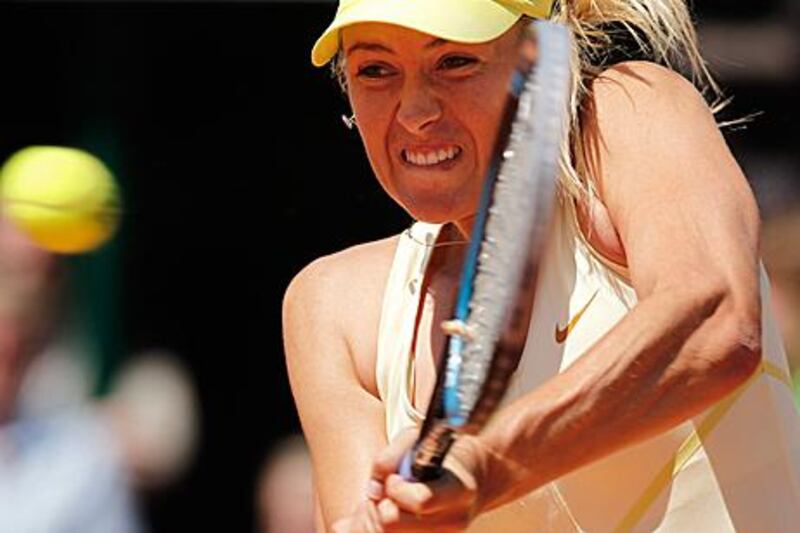In September 2007, Maria Sharapova seemed in a defiant mood as she sat down to write her blog. Coming to the US Open as defending champion, she had just suffered her earliest exit from a grand slam since 2004, losing her third-round match to Agnieszka Radwanska.
"I know it's as tough for my fans to handle my losses as it is for me," she wrote. "But let me point something out. I didn't leave my mom at the age of seven for nothing. I didn't spend six hours a day practising in the Florida sun at the age of nine for nothing …
"I didn't sleep in little cots for three years, eating oatmeal out of a packet while playing in the middle of nowhere for nothing. All this has helped me build character and there's no better asset than being able to stand up for yourself."
Sharapova did show glimpses of that indomitable spirit during the past 10 days at Roland Garros, standing up for herself until getting blown away by an impressive Li Na in the semi-finals yesterday.
Still, expect Sharapova's next blog to dwell more on the positives. This was her best performance at a grand slam since her triumph at the 2008 Australian Open, and it came on clay, her least-favourite surface, where she once described herself as a "cow on ice".
Sharapova failed to improve on her previous best at the French Open, a semi-final defeat in 2007, but her performance on the red clay has convinced many about her impending return to the top.
"Maria Sharapova is not a different player than she has been when she won three majors, but she is different than she has been in the last three years because she is fitter, she is quicker," Mats Wilander, a seven-time slam winner, said in a podcast. "She is playing on her worst surface, so imagine when she comes to Wimbledon and then her favourite surface, the US Open. She will start dominating on the women's tour."
Sharapova was at the top of women's tennis when a shoulder injury first visited her in 2007. She bounced back to win the 2008 Australian Open, running up a winning streak of 18 matches and reclaiming the world No 1 ranking. In August of that year, though, as she withdrew from the Rogers Cup with the shoulder injury, an MRI scan revealed she had been suffering from a rotator cuff tear since April.
That was the end of the season for Sharapova, as she underwent a surgery.
The following year, her ranking dropped to a low of No 126 and, save the quarter-final appearance at the 2009, she has suffered embarrassing early exits at every grand slam since.
At the height of her earlier reign in women's tennis, Sharapova was the most searched athlete on Yahoo! in 2005 and 2008, with a long wait-list of corporate suitors.
Being away from the second week at the majors has not reduced that appeal. Forbes placed her at No 81 in a list of top-100 celebrities last year and put her income at US$22 million (Dh80.8m) annually.
Sharapova concedes she now has "money that will feed my great-grandchildren", but tennis remains her top priority. Now 24, she held the same attitude when she was 13 and training on a scholarship at the Bollettieri Tennis Academy in Florida.
A reporter asked her then if she had the chance to win Wimbledon or make $20m in endorsements, which would she choose? Without any hesitation, she replied: "I would choose to win Wimbledon because then the millions will come."
She yearns for new grand-slam glory. "If I do win another it would be worth even more than the previous ones because there was a time when I thought that I would never be able to play tennis again," she said.
"There's no doubt there's tough moments. I don't think without tough moments the good ones would feel so good."
Sharapova has seen plenty of those tough moments. She began playing with a sawed-off racket in the Russian city of Sochi. In 1993, Martina Navratilova saw the little girl playing at a clinic in Moscow and told the father how gifted she was. Hearing those words, Yuri decided to take her to the United States, arriving in Miami with just $700 in 1994. Sharapova has few memories of the day she was leaving for the US, but her grandmother Galina recounted the moment in a 2004 interview.
"I watched little Maria getting ready to go to bed the night before they left," she said. "We were all so nervous, but she was so organised, folding her clothes neatly on the chair. It was as if she was preparing for her destiny."
Destiny, then, is about to add another chapter to Sharapova's colourful tale. The French Open is the past now, but Wimbledon beckons.





